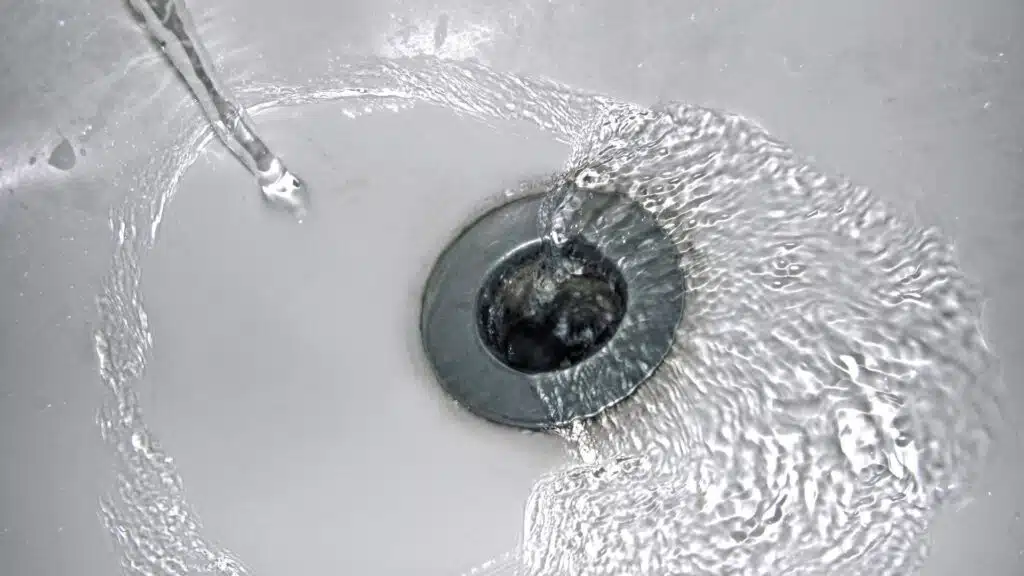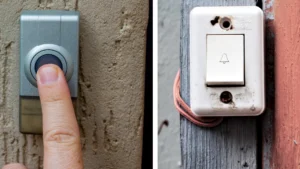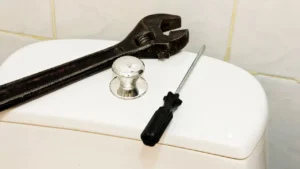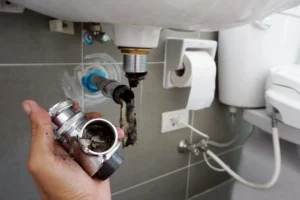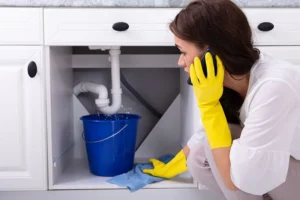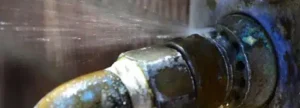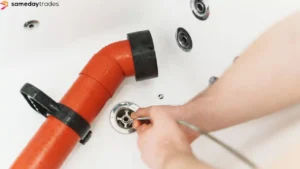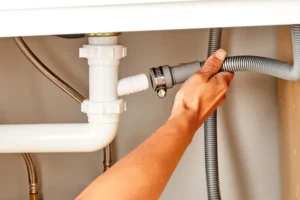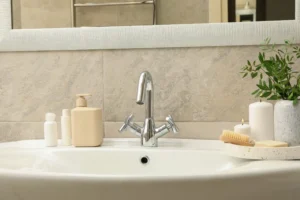Blocked drains are an annoying problem many of us face. Every year, countless households deal with this issue. This article offers simple tips and tricks to solve the problem at home, without calling a plumber.
Keep reading for easy solutions!
Signs and Causes of Blocked Drains
If your drain starts to smell bad or water backs up, it might be blocked. Things like hair, food, and small objects often cause these blockages.
Foul smell
A foul smell from your drain is a big hint of a blockage. Things stuck in the pipes, like food scraps or hair, start to rot and smell bad. This is not just unpleasant but also unhealthy.
Clearing blocked drains can stop this problem. Keeping drains free of things that shouldn’t be there helps avoid nasty smells. So, it’s good to act fast when you notice any bad odour coming from your drains.
A clean drain keeps the foul smell away.
Overflowing
Overflowing drains are a clear sign your pipes can’t handle what’s going down them. Water spilling over could mean blockages from oil, food scraps, or other items we shouldn’t flush.
It turns your kitchen or bathroom into a mess and can cause damage if not fixed fast. To clear blocked drains before they overflow, watch what you put down the sink and use simple fixes like boiling water or plungers.
Such problems often start small but get worse quickly. An overflowing drain might lead to water reaching places it shouldn’t, risking damage to floors and walls. Keeping an eye on what causes these issues helps avoid big troubles later on.
Quick actions and regular checks keep everything flowing right – making sure your home stays dry where it should!
Gurgling sounds
Gurgling sounds in your drains are like a warning bell. They tell you air is trapped somewhere because of a blockage. It’s pretty common, and it happens when something stops the water from flowing smoothly.
Think of it as trying to drink through a straw that’s got a bit squished. The noise alone can be enough to know you’ve got to clear that blocked drain.
Next up, we need to look at why your drain might be draining slowly…
Slow draining
Slow draining is a big sign your drain might be clogged. Water that takes too long to go down could mean there’s stuff blocking its way. Things like hair, soap bits, and other gunk often build up over time.
This makes water slow to drain. To clear blocked drains at home, you can try simple fixes first.
Next, tree roots can cause major issues for your pipes outside…
Tree roots
Moving on from slow draining, another culprit for blocked drains is tree roots. These sneaky invaders can grow into pipes, causing major blockages. Roots search for water and find it in your pipes, then they keep growing inside.
To clear a blocked drain caused by tree roots without calling a plumber might seem tough. Yet, you can try flushing salt down the toilet to discourage root growth or use a mixture of vinegar and baking soda followed by boiling water to kill off small roots.
Using these home remedies won’t fix big problems though. For serious blockages from tree roots, professional tools like a plumber’s snake or hydro jetting are needed. These methods cut through the roots and clear your pipes.
But remember, preventing tree roots from entering your drains in the first place is key. Regular checks around your home and gentle care with what goes down the drain can save you lots of trouble later on.
Toiletries
After discussing tree roots, another common cause of blocked drains is toiletries. Things like wipes, cotton pads, and sanitary products should not go down the toilet. They don’t break down easily and can quickly block pipes.
Even if a product says “flushable,” it’s often safer to bin it instead.
To clear blocked drains caused by toiletries without calling a plumber, avoid flushing these items. Regularly check what gets thrown into the toilet. If a block happens, try using a plunger or wire coat hanger to remove the obstruction gently.
This simple step can save you from bigger drain problems later on.
Foreign objects
Kids often see drains as secret paths for their toys. Small cars, action figures, and even bits of crayon find their way down the sink or toilet. Adults aren’t much better. They flush wipes, cotton buds, and other items not meant for drains.
These objects don’t break down like toilet paper does.
A blocked drain is often a hidden museum of odd things that should never have been flushed.
Clearing a blocked drain caused by foreign objects might need creativity. Sometimes you can reach in and grab whatever’s stuck if it’s close enough to the top. Other times, tools like pliers or a homemade hook crafted from a wire hanger come in handy to fish out those pesky invaders without calling for professional help.
Cooking oil
Cooking oil can cause big problems for your drains. Pouring it down the sink might seem like an easy way to get rid of it, but once it cools down, it sticks to pipes. This can make a blockage over time.
To keep your drains clear, cool the oil and throw it in the bin instead.
If oil has already caused a blockage in your drain, don’t stress. Try clearing it with hot water and dish soap first. This mixture can help break down the grease and clear the path again without calling a plumber.
Food scraps
Food scraps in the sink can lead to blocked drains. Bits of food might seem small, but they add up. They stick inside pipes, causing a mess. It’s best to throw them in the bin or compost.
This keeps your drain clear and saves you from trouble.
Keeping food out of the sink is easy if you use sink strainers. They catch scraps so you can toss them properly. A clean kitchen routine helps avoid blockages and keeps things running smoothly.
No one wants a blocked drain, so managing food waste right is key for a happy home.
Mineral build-up
Mineral build-up in pipes is a sneaky problem. It starts small, but over time, can lead to big blockages. This happens because water has minerals like calcium and magnesium. When water flows down your drains, these minerals stick to the inside of pipes.
They pile up and make it hard for water to pass through.
Clearing a blocked drain caused by mineral build-up needs some work. You might use vinegar and baking soda to break it down. Pour these into the drain, wait, then flush with hot water.
It’s like giving your drains a mini spa treatment! Sure, this method takes patience… But hey, it beats calling in a plumber!
A stitch in time saves nine—regularly tackle mineral build-up to keep your drains smooth sailing.
Soap
Moving on from mineral build-up, we find that soap is another common cause of blocked drains. Soap bars often have fats that mix with water minerals, forming a hard residue that sticks to your pipes.
This can slow down the flow or even block it completely.
To clear a drain blocked by soap residue, use hot water and dish soap. The heat melts the soap buildup while the detergent helps break it down further. Pour this mix slowly down the drain for an easy fix to keep things flowing smoothly again.
Hair
Hair is one of the main culprits behind blocked drains. It ties itself into knots and traps other bits, creating a big mess in your pipes. Each time we shower or brush our hair over the sink, strands fall out and head straight for the drain.
Over time, these strands build up. They mix with soap and other stuff to block water flow. To keep this from happening, use a drain strainer. This catches hair before it gets into your pipes.
Cleaning strainers regularly helps avoid blockages.
Simple steps can clear a blocked drain caused by hair without calling a plumber. Try pulling out clumps with a wire coat hanger or use boiling water to melt the greasy stuff holding the hair together inside your drain.
These methods are easy and can save you money on plumbing bills.
Natural debris
Leaves, twigs, and dirt can block drains easily. These bits from nature find their way into pipes during storms or just because of the wind. They might seem small, but they pack a punch in clogging up your drainage system.
Debris like this builds up over time and creates a stubborn blockage. The key is to catch it early by checking the drain covers regularly and clearing away any natural materials before they get washed in.
Next up, let’s talk about how cat litter contributes to blocked drains…
Cat litter
Cat litter should never go down the drain. It might seem like an easy way to get rid of it, but it’s not a good idea. Cat litter clumps and blocks pipes as it absorbs water and expands.
This can quickly lead to a blocked drain that’s hard to clear without help.
Trying to flush cat litter away can also harm the environment. Most types contain chemicals and other materials that don’t break down easily. Over time, these can pollute our waterways and hurt wildlife.
Always throw cat litter in the bin, where it belongs.
Proactive Measures to Avoid Blocked Drains
Stopping blocked drains starts with what we do every day. Keep oils and food scraps out of the sink, clean drain covers often, and use strainers to catch hair and bits before they go down.
Proper disposal of cooking oil and food scraps
Pouring cooking oil down the drain can lead to serious blockages. Instead, cool it down and pour it into a container. Then, throw that container in the bin. Food scraps should also go straight to the bin or onto a compost pile if you have one.
These steps help keep drains clear.
Using a strainer in your sink catches bits of food and debris before they get into the pipes. Make sure to clean this strainer regularly to avoid build-up on top of it. Keeping these habits will make your drains happy and lower chances of blockages in your home.
Regular cleaning of drain covers
Just as you wouldn’t let food scraps and cooking oil clog your drains, don’t forget about cleaning the drain covers. It’s a simple task, yet it can stop bigger problems in their tracks.
Pull off the covers and give them a good scrub to remove any buildup of soap, hair, or other debris. Doing this regularly keeps water flowing smoothly and prevents those nasty blockages that take ages to clear.
Make it a routine—like wiping down counters or sweeping floors. Clearing out whatever collects on these covers doesn’t just help water run faster; it also cuts down on odors and reduces the chance of unexpected plumbing emergencies.
You’ll save time, money, and maybe avoid having to call in experts for something you can easily fix yourself with a bit of foresight and effort.
Use of drain strainers for hair and other debris
Moving on from keeping drain covers clean, let’s talk about how using drain strainers can help you clear blocked drains. Drain strainers catch hair and other debris before they get into your pipes.
This simple tool can save you a lot of trouble. Place them in your sink, shower, and bathtub drains to trap hair and small bits that often cause clogs.
Think of these strainers as little guards. They work hard to make sure unwanted stuff doesn’t go down the drain. Cleaning these strainers regularly is easy – just pull them out, remove the caught debris, and put them back in place.
It’s a quick step towards preventing blocked drains in your home without needing a plumber’s help.
9 Methods for Clearing Blocked Drains Using Household Items
Looking to fix a blocked drain with things from your home? We’ve got easy tips that work wonders, using items you probably already have.
Plunger
A plunger can be your first friend in the fight against blocked drains. It’s simple to use and often works fast. You just need to make sure you have a good seal around the drain before you start plunging up and down.
This action creates pressure that can push the blockage out of the way, clearing your drain. Keep doing this for a minute or two, and you might just clear that stubborn block without needing any fancy tools.
For sinks and toilets alike, using a plunger is a quick fix to try before reaching for chemical drain cleaners or calling in professionals. Make sure the plunger cup fully covers the drain opening, then give it a firm push down followed by an equally strong pull up.
This method helps in moving whatever is blocking your drain and gets water flowing again smoothly.
Homemade drain cleaner
You can make a blocked drain cleaner right at home. Mix baking soda and vinegar, then pour it down the drain. Wait for about an hour. After that, flush it with hot water. This mix breaks down the gunk blocking your pipes.
Next, try using a wire coat hanger if the blockage is still there.
Store-bought chemical drain cleaner
Store-bought chemical drain cleaners are quick fixes for blocked drains. They work by breaking down the stuff that causes the block, like hair or grease. Be careful, though; these chemicals are strong and can harm your pipes if used too much.
Always follow the instructions on the bottle, wear gloves, and keep your face away from fumes to stay safe.
These cleaners offer a simple way to tackle tough clogs without calling in a plumber. Just pour them down the drain, wait as directed, then flush with water. Despite their power, it’s good to use them only when needed.
For regular maintenance, opt for gentler methods like boiling water or baking soda mixes to keep drains clear and avoid damage.
Wire coat hanger
Moving on from chemical cleaners, a wire coat hanger can be quite the tool to clear blocked drains. Straighten out the hanger but leave the hook. Push this homemade tool down the drain.
Wiggle it about to catch hair and other gunk. Once you feel it hook onto something, gently pull it out. This method is simple and uses items you probably have at home.
Be careful not to push debris further down while using the wire coat hanger. It’s all about gentle movements to remove blockages without calling a plumber.
Drain snake/drain auger
After sorting out blockages with a wire coat hanger, you might still find some drains tough to clear. A drain snake, or drain auger, steps in as the next tool for the job. It’s a bit like a flexible metal rope with a spiral at one end.
You push this down the blocked drain until it reaches the clog. Then, by turning the handle, you twist the spiral into the blockage. This either breaks it apart or grabs hold so you can pull it out.
Using a drain snake doesn’t require special skills but does need some patience and elbow grease. It’s perfect for reaching deeper down where other methods can’t get to easily. Plus, it avoids using harsh chemicals that might harm your pipes over time.
For stubborn blocks deep within your drainage system, giving this tool a whirl could save you from calling in professional help right away.
High-pressure water jetting
Moving from using a drain snake, we come to high-pressure water jetting. This method uses a powerful blast of water to break down blockages. It’s strong enough to clear soap build-up, tree roots, and other tough blockages in your drains.
You aim the jet at the blockage, and the force of the water pushes it through. This clears the way for water to flow smoothly again.
High-pressure water jetting is safe for your pipes but should be done carefully. You don’t need harsh chemicals, so it’s better for your health and the environment. If you’re dealing with a stubborn blocked drain, this method can help sort it out quickly and efficiently.
Boiling water
Boiling water is a simple trick to clear blocked drains. Just boil a kettle of water and pour it slowly down the drain. This can melt grease and soap that’s blocking the pipe. It’s easy but be careful with pipes that are not metal, as hot water can damage them.
Use boiling water together with dish soap for tougher clogs. Pour some dish soap into the drain first, then follow it with boiling water. The soap breaks down fat and grease, making it easier for hot water to flush through.
This method works well in kitchen sinks where grease often builds up.
Natural enzyme drain cleaner
Natural enzyme drain cleaners are a great pick to clear blocked drains. They use enzymes and good bacteria to eat away at the gunk in your pipes. This method is safe for your pipes and the environment.
You can find these cleaners at most shops.
You just pour it down the drain, wait a bit, then flush with water. It’s an easy way to tackle blockages without harsh chemicals. Plus, it keeps drains smelling fresh by breaking down organic material that causes bad odours.
Hot water and dish soap
Moving on from natural enzyme cleaners, a simple mix of hot water and washing-up liquid can work wonders. Pour a kettle of boiling water down the drain. Then, add a few squirts of washing-up liquid.
The hot water breaks down grease and gunk, while the soap cleans it away. It’s an easy fix for greasy blockages.
This method is great for kitchen sinks where cooking oil and food scraps build up over time. After pouring in the hot water and washing-up liquid, run some more hot tap water to clear everything out.
You might need to repeat this process if your drain is very blocked. This way, you don’t have to call a plumber just yet!
Professional Solutions for Clearing Blocked Drains
For tough blocked drains that home methods can’t fix, professional solutions are there to help. They use tools and skills to get your pipes clear again. Keep reading to learn how they do it!
Plumbers drain snake
A plumber’s drain snake, also known as a drain auger, is a handy tool for clearing blocked drains. It’s like a long, flexible metal cable with a spiral at one end. You push this cable down the drain until it hits the blockage.
Then, you turn the handle to break or grab the stuff causing the blockage so water can flow again. This tool works well for tough clogs that plungers can’t fix.
Professionals often use this tool because it reaches deeper than most home solutions and deals with bigger problems in pipes. If your home remedies don’t clear up the problem, calling in someone with a plumber’s drain snake might be your best bet.
They know how to use it without damaging your pipes and can sort out those stubborn blocks fast and effectively.
CCTV inspection
CCTV inspection is a smart move for really tricky blocked drains. Experts use a special camera to look inside the pipes. This way, they see exactly what’s causing the blockage without having to dig up your yard.
It might show tree roots, build-ups of grease, or things that shouldn’t be in there at all. Knowing this helps them decide the best way to clear it out.
After figuring out what’s wrong using CCTV, professionals often suggest hydro jetting next.
Hydro jetting
Hydro jetting uses a high-pressure water stream to clear blocked drains. This method shoots water through the drain at strong pressures, breaking up and washing away blockages. Professionals often use it for tough clogs that other methods can’t fix.
It’s safe for your pipes and effective against grease, tree roots, and stubborn debris.
This approach needs special equipment only plumbers have. So, if you’ve tried everything to clear a blocked drain without success, calling in a pro for hydro jetting might be your best bet.
They’ll assess the situation and use this powerful tool to get your drains running smoothly again.
Excavation
Moving from hydro jetting, we go deeper with excavation. This method digs down to where the blockage lives. It’s not the first choice but it helps when others fail. The team takes out part of the earth to reach and fix or replace pipes.
Excavation is a big step for serious drain problems. Workers use tools like shovels and machinery to get to the blocked pipes underground. They carefully remove soil until they see the problem area.
Then, they can clear the block or put in new pipes as needed. This method makes sure your drains work well again, but it needs professionals who know how to do it right without harm.
Pipe relining
Pipe relining is a way to fix pipes from the inside. This method uses a special resin, which hardens inside the old pipe to create a new, smooth surface. It stops leaks and makes water flow better without digging up your garden or breaking floors.
Pipe relining can save time and money because it’s quicker and doesn’t need as much work to get things back to normal.
This technique works well for both big and small pipes in your home. After clearing the blockage, using this approach helps keep drains clear longer. Next, let’s look at other professional solutions for keeping those drains running smooth.
Conclusion
Clearing blocked drains yourself can save you a heap of cash and hassle. You’ve got loads of options – from using a simple plunger to homemade drain cleaners or even a wire hanger.
Sure, it might get messy, but with the right tools and a bit of elbow grease, those stubborn blocks don’t stand a chance. And hey, if things get too tricky, professional help is just a call away.
So give it a go – your drains will thank you!

